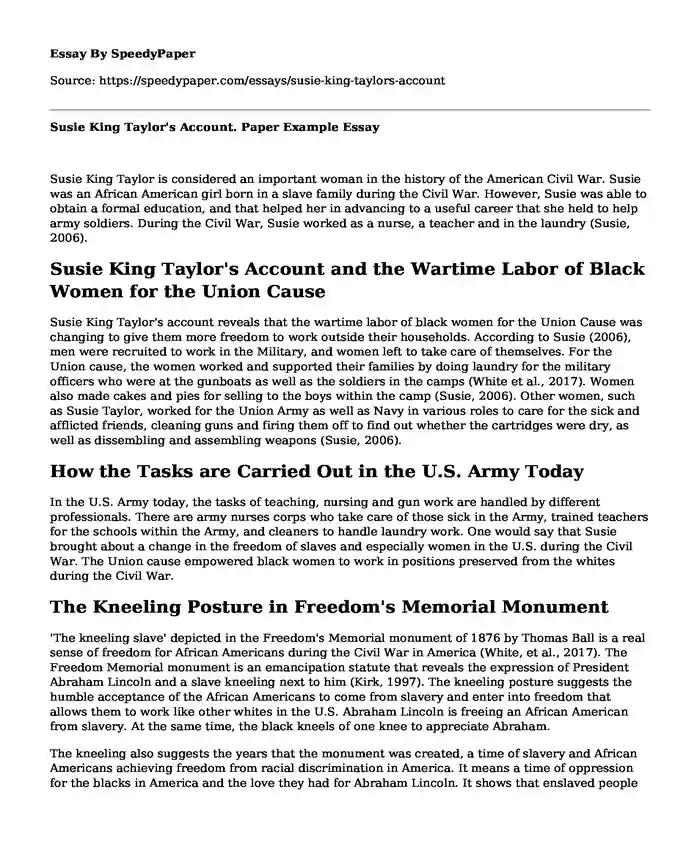
| Type of paper: | Essay |
| Categories: | Race Women American Civil War American history |
| Pages: | 3 |
| Wordcount: | 665 words |
Susie King Taylor is considered an important woman in the history of the American Civil War. Susie was an African American girl born in a slave family during the Civil War. However, Susie was able to obtain a formal education, and that helped her in advancing to a useful career that she held to help army soldiers. During the Civil War, Susie worked as a nurse, a teacher and in the laundry (Susie, 2006).
Susie King Taylor's Account and the Wartime Labor of Black Women for the Union Cause
Susie King Taylor's account reveals that the wartime labor of black women for the Union Cause was changing to give them more freedom to work outside their households. According to Susie (2006), men were recruited to work in the Military, and women left to take care of themselves. For the Union cause, the women worked and supported their families by doing laundry for the military officers who were at the gunboats as well as the soldiers in the camps (White et al., 2017). Women also made cakes and pies for selling to the boys within the camp (Susie, 2006). Other women, such as Susie Taylor, worked for the Union Army as well as Navy in various roles to care for the sick and afflicted friends, cleaning guns and firing them off to find out whether the cartridges were dry, as well as dissembling and assembling weapons (Susie, 2006).
How the Tasks are Carried Out in the U.S. Army Today
In the U.S. Army today, the tasks of teaching, nursing and gun work are handled by different professionals. There are army nurses corps who take care of those sick in the Army, trained teachers for the schools within the Army, and cleaners to handle laundry work. One would say that Susie brought about a change in the freedom of slaves and especially women in the U.S. during the Civil War. The Union cause empowered black women to work in positions preserved from the whites during the Civil War.
The Kneeling Posture in Freedom's Memorial Monument
'The kneeling slave' depicted in the Freedom's Memorial monument of 1876 by Thomas Ball is a real sense of freedom for African Americans during the Civil War in America (White, et al., 2017). The Freedom Memorial monument is an emancipation statute that reveals the expression of President Abraham Lincoln and a slave kneeling next to him (Kirk, 1997). The kneeling posture suggests the humble acceptance of the African Americans to come from slavery and enter into freedom that allows them to work like other whites in the U.S. Abraham Lincoln is freeing an African American from slavery. At the same time, the black kneels of one knee to appreciate Abraham.
The kneeling also suggests the years that the monument was created, a time of slavery and African Americans achieving freedom from racial discrimination in America. It means a time of oppression for the blacks in America and the love they had for Abraham Lincoln. It shows that enslaved people held Lincoln with high esteem. Kirk (1997) stated that the monument with the kneeling posture portrays loyalty the slaves had towards Lincoln. One can say that the kneeling position is a reflection of the shift of sensibilities regarding race and the growing sense of empowerment of the African Americans during the Civil War. It suggests the beginning of saving the black man from slavery. Africans could not protect themselves from racial discrimination, and the kneeling posture is a sign of intervention of Lincoln in the matters of African Americans to change their status in the society from the oppressed to free people in the U.S.
References
Kirk, S. (1997). Standing soldiers, kneeling slaves: Race, war, and monument in nineteenth-century America. Princeton, NJ: Princeton University Press.
Susie, K.T. (2006). Reminiscences of my life in camp: An African American woman's Civil War memoir. Athens: University of Georgia Press.
White, D., Bay, M., & Martin, W. (2017). Freedom on my mind: A history of African Americans with documents. University of California, Berkeley.
Cite this page
Susie King Taylor's Account. Paper Example. (2023, Apr 23). Retrieved from https://speedypaper.net/essays/susie-king-taylors-account
Request Removal
If you are the original author of this essay and no longer wish to have it published on the SpeedyPaper website, please click below to request its removal:
- Descartes Philosophy Essay Sample
- Haleema's Personality, Free Essay on Child Development
- Essay Sample on Aerospace Inc.: Organizational Facts, Metrics, And Characteristics
- Free Essay Sample: Improvement of Childcare
- Free Essay Example - Literary Texts and Contemporary Events
- Essay Example. Indian Grocery Store
- Essay Sample on Recruiting Challenges and Recommendations
Popular categories




